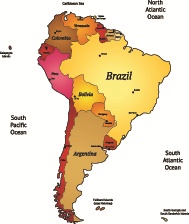This project aims to stimulate debate and research on women and Independence in Latin America by building on public interest in women’s involvement in the Independence Wars, triggered by the bicentenaries, and women’s unprecedented presence in Latin American politics today.
 Building on an existing static, read-only web site, the project will seek to develop the site into an interactive, community-driven and community-contributed resource, which will encourage participation and ownership by Latin American women themselves.
Building on an existing static, read-only web site, the project will seek to develop the site into an interactive, community-driven and community-contributed resource, which will encourage participation and ownership by Latin American women themselves.
The existing web site www.genderlatam.org.uk resulting from the AHRC-funded project ‘Gendering Latin American Independence’ (2001-2006), consists of a wealth of data which provides an important research tool.
Since 2006 the site has been widely disseminated across the UK and abroad, mainly in the context of the bicentenaries of Latin American Independence, to academic and general audiences. However the web site was built in the early 2000s using the technology available then and, as such, is limited in coverage and above all functionality. This follow-on project will enable a second stage of technology development with new website facilities to encourage public engagement.
The aim is to empower Latin American women so that eventually they can take ownership of the resource thus ensuring long-term sustainability.
Partners: Latin American Womens Rights Service, Museo de la Mujer
Uncovering the Invisible
As part of this project Horizon have been working in partnership with the University’s Centre for Advanced Studies (CAS), with support by the Instituto Cervantes in Manchester on The documentary photographic exhibition, Uncovering the Invisible: A Portrait of Latin Americans in the UK.
The exhibition is on display at the Instituto Cervantes in Manchester until May 8. Featuring 22 photographs by sibling Mexican-British photographers Pablo and Roxana Allison, the exhibition aims to bring into focus this ethnic group which has been hitherto invisible in British society.
It is one of the first temporary exhibitions to experiment with the use of Near Field Communication (NFC). NFC is an emerging technology which, for instance, allows NFC-enabled mobile phones to access information embedded in smart tags. The experiment, designed by Dr Laura Carletti, a research fellow from the University’s Horizon Digital Economy Research Hub, aims at exploring how to enhance visitors’ experience through the seamless interplay of physical and digital spaces, and is part of the Horizon research on creative visiting.
Among those giving their experiences of living in the UK are Fernando from Paraguay who works in the banking sector; primary school student Sabrina from Ecuador and documentary filmmaker Lucia from Guatemala.
Many speak with affection about their homeland, traditions and cultures while often also talking about the acceptance they have encountered in their adoptive communities.
Dr Carletti said: “Uncovering the Invisible is a temporary and touring exhibition, so the main challenge was to design for a sustainable experience, as well as for a rapid and replicable deployment. So, the experiment was developed around the use of personal smart phones and off-the-shelf technologies. The exhibition opened in March, and the first visitors’ feedbacks on the augmented experience have been very encouraging.”
The exhibition has been funded by Horizon and the University’s Centre for Advanced Studies (CAS), and supported by the Instituto Cervantes in Manchester, and involves collaboration with three community organisations, the Latin American Recognition Campaign (LARC), the Coalition of Latin Americans in the UK (CLAUK) and Latin American Women’s Rights Service (LAWRS).
It supports the aims of the Latin American Recognition Campaign by presenting the faces and stories of the individuals who constitute the Latin American community to a broader UK public. LARC — set up in April 2010 and strongly endorsed by the Mayor of London — has been lobbying for official recognition of the community since its launch and has achieved its objective in Southwark and Lambeth, where Latin American is now recognised as a specific ethnic minority.





 Building on an existing static, read-only web site, the project will seek to develop the site into an interactive, community-driven and community-contributed resource, which will encourage participation and ownership by Latin American women themselves.
Building on an existing static, read-only web site, the project will seek to develop the site into an interactive, community-driven and community-contributed resource, which will encourage participation and ownership by Latin American women themselves.







